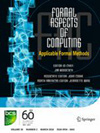This journal aims to publish contributions at the junction of theory and practice. The objective is to disseminate applicable research. Thus new theoretical contributions are welcome where they are motivated by potential application; applications of existing formalisms are of interest if they show something novel about the approach or application. The term "formal methods" has been applied to a range of notations theories and tools. here is no doubt that some of these have already had a significant impact on practical applications of computing. Indeed it is interesting to note that once something is adopted into practical use that it is no longer thought of as a formal method. Apart from widely used notations such as those for syntax and state machines there have been significant applications of specification notations development methods and tools both for proving general results and for searching for specific conditions. However the most profound and lasting influence of the formal approach is the way it has illuminated fundamental concepts like those of communication. In this spirit the principal aim of this journal is to promote the growth of computing science to show its relation to practice and to stimulate applications of apposite formalisms to practical problems. One significant challenge is to show how a range of formal models can be related to each other. In particular the scope of Formal Aspects of Computing includes the following: well-founded notations for the description of systems verifiable design methods elucidation of fundamental computational concepts approaches to fault-tolerant design theorem-proving support state-exploration tools formal underpinning of widely used notations and methods formal approaches to requirements analysis Normal scientific standards are expected of all contributions: papers must be soundly based place their contribution in context and provide adequate references. Material which is already widely available (e.g. as conference proceedings) will not normally be considered unless the work has been further developed and refined.
